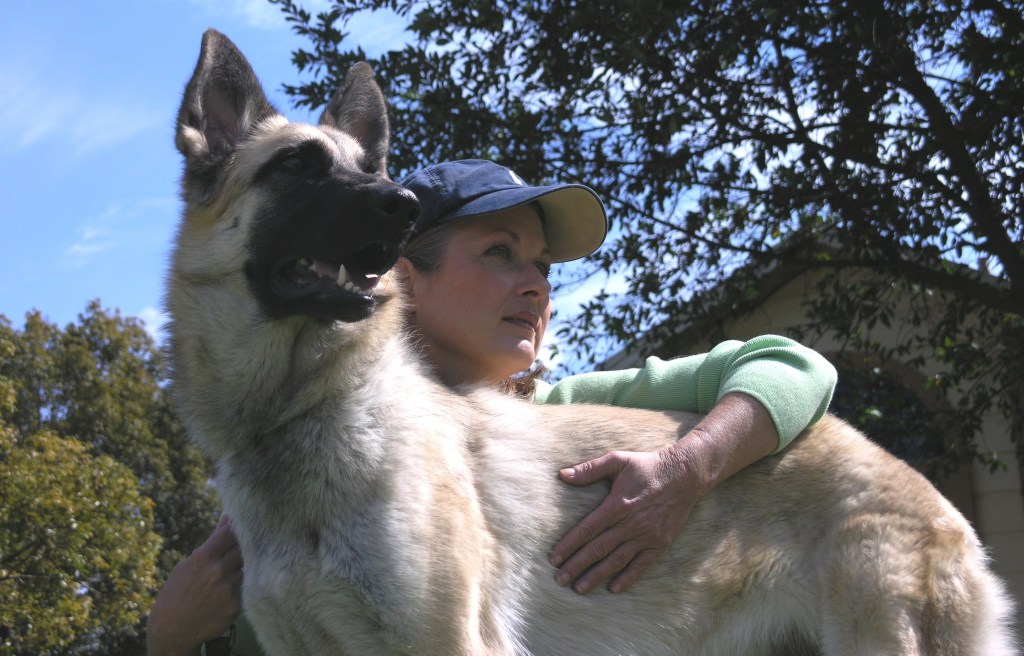PTSD Service Dogs can save a person’s life! There are waiting lists of 2 to 3.5 years for disabled veterans who need a trained PTSD Service Dog. Why?
I have served on the Board of Directors of The Dog Liberator since it’s inception. The Dog Liberator is a non-profit organization dedicated to rescuing homeless and abandoned dogs, primarily dogs from high-kill shelters and owners who can no longer care for them. By working with committed volunteers, local veterinarians, trainers, and foster homes, TDL has been able to rescue hundreds of dogs every year. From June of 2009 to date, TDL has rescued, rehabilitated, spay/neutered, and re-homed over 700 dogs throughout the Southeast. The adopted dogs have gone on to lives as service dogs, working dogs, and pets.

Last week a person contacted The Dog Liberator requesting assistance in re-homing a fully trained PTSD and seizure alert German Shepherd, whose owner had passed away. The dog’s guardian will assist in selecting the new owner who most closely meets the dog’s needs.
The transition will include a foster period and training with a professional service dog trainer.
On Veteran’s Day, the dog was posted to Facebook. The post received over 250 shares and over 90,000 views. By the next day, more than 40 people had contacted The Dog Liberator wanting the dog. Many of the stories were heartbreaking.
We were surprised by how many people assumed that any “Service Dog” could perform “ANY” service.
We were surprised by people who did not understand that they would need to work with a professional trainer to see if this Service Dog was a fit for them and to ensure that they were properly engaging with the dog and his abilities.
We were surprised by how many people did not realize that there are many different facets to PTSD and that individual Service Dogs are trained for specific tasks for specific people.
Several inquiries were identified as people who had the intention of selling the dog for a high profit. The outpouring of attention brought the overwhelming need for trained Alert PTSD Service Dogs to the forefront. None of us had any idea how difficult it is for disabled veterans and people living with PTSD and/or brain injuries too quickly and inexpensively acquire a trained Alert PTSD Service Dog. We witnessed first hand a lot of misinformation
Heartbreak!

The most heartbreaking story came from an out of state veteran who works with other veterans with PTSD and brain injuries.
He confirmed that there is a 2 year to 3.5 plus year waiting period for trained PTSD Service Dogs in his state.
He told us that in his county alone, 22 veterans with PTSD and/or brain injuries committed suicide last year and 17 veterans so far in 2014 have committed suicide. I choke back tears just writing this and thinking of these selfless individuals who served our country and now suffer alone.
We spoke to another disabled veteran in Wisconsin with PTSD. She told us that her wait was much shorter and her fees much lower. Her service dog is a seizure alert, heart attack alert and PTSD dog who carries her medications and instructions. Once she was introduced to her breeder, her interactions with her puppy began at birth. As soon as the puppy was old enough to leave his mother, they participated in a weekly training session at her own home for 10 months. She didn’t discuss the fees but told me that the total was significantly less than mentioned above. The key to her training was having the puppy sleep on her heart from the day he was born. Dogs quickly clue into their person’s body signals.
How do we get more PTSD Service Dogs trained quickly and into these Veterans homes?
 Our disabled veteran friend in Wisconsin told me that in her state the prisoners train abandoned dogs from the animal shelters as PTSD and Alert Service Dogs. They have a work program that is coordinated with the local Veterans organization. The prisoners enjoy the interaction with their dogs and know that their work will make the difference in a veteran’s life. By minimizing training fees, they can train the services dogs quickly and at a lower cost. It sounds like a win-win program that should be duplicated across the country. How does that happen?
Our disabled veteran friend in Wisconsin told me that in her state the prisoners train abandoned dogs from the animal shelters as PTSD and Alert Service Dogs. They have a work program that is coordinated with the local Veterans organization. The prisoners enjoy the interaction with their dogs and know that their work will make the difference in a veteran’s life. By minimizing training fees, they can train the services dogs quickly and at a lower cost. It sounds like a win-win program that should be duplicated across the country. How does that happen?
Suicide Rates Among Veterans
Per CNN September 2013 article.
- (CNN) — Every day, 22 veterans take their own lives. That’s a suicide every 65 minutes. As shocking as the number is, it may actually be higher.
- Nearly one in five suicides nationally is a veteran, even though veterans make up about 10% of the U.S. population.
- “There’s probably a tidal wave of suicides coming,” says Brian Kinsella, an Iraq war veteran who started Stop Soldier Suicide, a nonprofit group that works to raise awareness of suicide. Between October 2006 and June 2013, the Veterans Crisis Line received more than 890,000 calls. That number does not include chats and texts.
- Per our Wisconsin disabled veteran friend, she believes that many veteran suicides are related to changes in medications, difficulty getting medical services, cutbacks in pain medications, living with extreme physical pain, feeling abandoned and a feeling of “hopelessness.”
What is PTSD, Post Traumatic Stress Disorder?
Post-traumatic stress disorder (PTSD) is a debilitating anxiety disorder that occurs after experiencing or witnessing a traumatic event that involves either a real or perceived threat of injury or death. In the old days, veterans referred to it as “shell shock.”
PTSD sufferers have a heightened sense of danger and impending doom. Their natural “fight or flight response” is damaged, causing them to feel stressed or fearful even in safe situations.
Many disabled veterans with PTSD experience:
- flashbacks, in which it feels as if the event is occurring over and over
- intrusive, vivid memories of the event
- frequent nightmares about the event
- mental or physical discomfort when reminded of the event
- emotional apathy
- detachment from or lack of interest in daily activities
- amnesia (memory loss) about the actual event
- inability to express feelings
- avoidance of people or situations that are reminders of the event
- difficulty concentrating
- startling easily
- exaggerated response to startling events
- constantly feeling on guard (hypervigilance)
- irritability or bouts of anger
- difficulty falling or staying asleep
- may be plagued by guilt, worry, and depression
- susceptible to panic attacks, which can cause:
- agitation or excitability
- dizziness
- lightheadedness or fainting
- racing or pounding heart
- headache
- PAIN and fluctuations in availability of medications
Is there a way to identify and rescue more homeless dogs with the intuitive abilities to be trained as PTSD Alert Service Dogs and connect them with Veterans who need them?
Things we learned about Service Dogs!
- There is between a 2 year and 3.5-year waiting list for Disabled Veterans with PTSD who want and need a trained Service Dog.
- Many PTSD Service Dog trainers charge the Veteran between $12,000 and $25,000 for a “Certified” dog. Only a few are donor supported.
- There is NO Federal ADA endorsed or supported certification.
- Certifications for Service Dogs are through the different societies who train the service dogs for different purposes.
- The ADA states that a Service Dog must be trained, but they do not specify who must train the dog.
- The ADA does not require a certificate of certification for a Service Dog.
- The ADA Federal Law mandates that a place of business, including food service, may not deny service to a person with a Service Dog.
- A service animal is a dog that is individually trained to do work or perform tasks for a person with a disability.
- There are “do it yourself” training programs for PTSD service dogs available on-line.
- Many people confuse Emotional Support Animals with Service Dogs.
- Emotional Support Animals are not protected as Service Dogs under the ADA.
- It is illegal to pretend that a Pet is a Service Dog.
- There are many companies on-line that sell fake Service Dog certificates.
- Service Dogs are trained to be good citizens in public.
- A business owner may ask a person with a Service Dog to leave if the person does not maintain proper control of the animal.
- Food service businesses may not claim Health Laws to prevent a person with a Service Dog from entering their business.
- The Fair Housing Act for housing and The ADA for Public Places of Accommodation follow different rules.
The ADA law only permits a business to ask 2 questions about the Service Dog.

Is the dog a service animal required because of a disability?
What work or task has the dog been trained to perform?
By law, Staff cannot ask a Disabled Person:
- about a person’s disability
- to show or require medical documentation
- to show or require a special identification card or training documentation for the dog
- ask that the dog demonstrates its ability to perform the work or task
Service animals are defined as dogs that are individually trained to do work or perform tasks for people with disabilities.

Examples of such work or tasks include:
- guiding people who are blind
- alerting people who are deaf
- pulling a wheelchair
- alerting and protecting a person who is having a seizure
- reminding a person with mental illness to take prescribed medications
- calming a person with Post Traumatic Stress Disorder (PTSD) during an anxiety attack
Service animals are working animals, not pets. The work or task a dog has been trained to provide must be directly related to the person’s disability.
Dogs and other animals whose sole function is to provide comfort or emotional support do not qualify as service animals under the ADA.
- ONLY Dogs and in some cases miniature horses are recognized by the ADA as service animals.
Disability Smart Solutions offers FREE public service talks to community organizations about Service Dogs and other ADA issues. Please contact us if you need a speaker.
We train businesses about Service Dogs and offer an Undercover Mystery Disabled Guest with Service Dog site survey to business owners.
